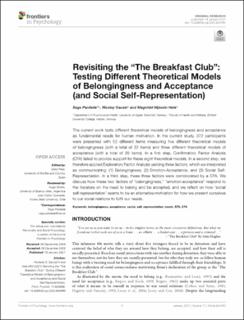| dc.contributor.author | Pardede, Saga | |
| dc.contributor.author | Gausel, Nicolay | |
| dc.contributor.author | Høie, Magnhild Mjåvatn | |
| dc.date.accessioned | 2021-07-05T11:52:41Z | |
| dc.date.available | 2021-07-05T11:52:41Z | |
| dc.date.created | 2021-01-18T11:38:07Z | |
| dc.date.issued | 2021 | |
| dc.identifier.citation | Frontiers in Psychology. 2021, 11, Artikkel 604090. | en_US |
| dc.identifier.issn | 1664-1078 | |
| dc.identifier.uri | https://hdl.handle.net/11250/2763400 | |
| dc.description.abstract | The current work tests different theoretical models of belongingness and acceptance as fundamental needs for human motivation. In the current study, 372 participants were presented with 52 different items measuring five different theoretical models of belongingness (with a total of 32 items) and three different theoretical models of acceptance (with a total of 20 items). In a first step, Confirmatory Factor Analysis (CFA) failed to provide support for these eight theoretical models. In a second step, we therefore applied Exploratory Factor Analysis yielding three factors, which we interpreted as communicating: (1) Belongingness, (2) Emotion-Acceptance, and (3) Social Self-Representation. In a third step, these three factors were corroborated by a CFA. We discuss how these two factors of “belongingness,” “emotion-acceptance” respond to the literature on the need to belong and be accepted, and we reflect on how ‘social self-representation’ seems to be an alternative motivation for how we present ourselves to our social relations to fulfill our needs. | en_US |
| dc.language.iso | eng | en_US |
| dc.publisher | Frontiers | en_US |
| dc.subject | belongingness | en_US |
| dc.subject | acceptance | en_US |
| dc.subject | social | en_US |
| dc.subject | self | en_US |
| dc.subject | representation | en_US |
| dc.subject | needs | en_US |
| dc.subject | EFA | en_US |
| dc.subject | CFA | en_US |
| dc.title | Revisiting the “The Breakfast Club”: Testing Different Theoretical Models of Belongingness and Acceptance (and Social Self-Representation) | en_US |
| dc.type | Peer reviewed | en_US |
| dc.type | Journal article | en_US |
| dc.description.version | publishedVersion | en_US |
| dc.subject.nsi | VDP::Samfunnsvitenskap: 200::Psykologi: 260 | en_US |
| dc.source.volume | 11 | en_US |
| dc.source.journal | Frontiers in Psychology | en_US |
| dc.identifier.doi | 10.3389/fpsyg.2020.604090 | |
| dc.identifier.cristin | 1873077 | |
| dc.source.articlenumber | 604090 | en_US |
| cristin.ispublished | true | |
| cristin.fulltext | original | |
| cristin.qualitycode | 1 | |
